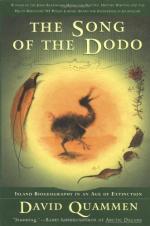
|
| Name: _________________________ | Period: ___________________ |
This test consists of 5 short answer questions, 10 short essay questions, and 1 (of 3) essay topics.
Short Answer Questions
1. What does Quammen says Charles Darwin and Alfred Wallace had in common?
2. Where did the dodo nest?
3. How does Quammen say lizards probably arrived at Krakatau?
4. What important book did Robert McArthur and Edward Wilson publish in 1967?
5. What were Frank Preston's findings in plotting the distribution of species in island habitats?
Short Essay Questions
1. What examples does Quammen use of dispersal ability?
2. What was MacArthur and Wilson's contribution to island biogeography?
3. Describe the process by which scientists generate policies for managing ecosystems.
4. Who is Frank Preston, and what was his contribution to the discussion of island size and species count?
5. Who is Philip Darlington, and what was his contribution to the discussion of island size and species count?
6. What is the difference between an isolate and a sample, according to Quammen?
7. What is the governing metaphor in the opening chapter?
8. What took David Quammen to Madagascar?
9. What is the first explanation Quammen offers for the relationship between island size and species count?
10. What does Quammen say about the overall pattern of the Persian rug?
Essay Topics
Write an essay for ONE of the following topics:
Essay Topic 1
What is missing from this book? What should have been covered or presented that was not? What is the effect of this absence? Describe an element that ought to have been covered, and explain why it would have made the book stronger.
Essay Topic 2
Debate the proposition that human beings have an obligation to conserve as much land as possible, and to keep as many species as possible safe from extinction due to human development.
Essay Topic 3
If you were in charge of protecting the maximum number of species in your region, would you create one large nature reserve, or a number of smaller reserves? Use arguments from the book as well as descriptions of local wildlife in your answer.
|
This section contains 742 words (approx. 3 pages at 300 words per page) |

|




